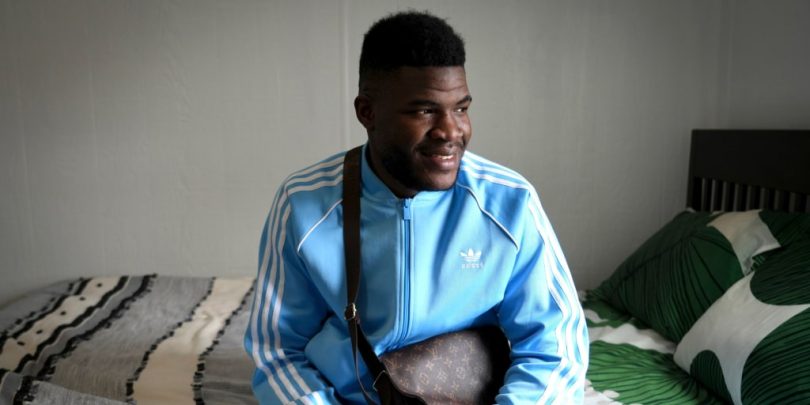Cabrel Ngounou’s life in Cameroon quickly unraveled after neighbors caught the teenager with his boyfriend.
A crowd surrounded his boyfriend’s house and beat him. Ngounou’s family learned of the relationship and kicked him out. So Ngounou fled — alone and with little money — on a dangerous, four-year journey through at least five countries. He was sexually assaulted in a Libyan prison, harassed in Tunisia and tried unsuccessfully to take a boat to Europe.
“The worst thing was that they caught us. So it was not easy for my family,” Ngounou said. “My sisters told me I need to get out of the house because my place is not there. So that’s what really pushed me to leave my country.”
Ngounou’s troubles drew attention after he joined a protest outside the U.N. refugee agency’s Tunisia office. Eventually, he arrived in the United States, landing in San Francisco in March.
Ngounou joined a growing number of LGBTQ people accepted into the Welcome Corps, which launched last year and pairs groups of Americans with newly arrived refugees. So far, the resettlement program has connected 3,500 sponsors with 1,800 refugees, and many more want to help: 100,000 people have applied to become sponsors.
Cabrel Ngougou, center, a refugee from Cameroon, with his sponsors Lori Ostlund, left, and Anne Raeff in their home in San Francisco on Sept. 17.Terry Chea / AP
President Joe Biden has sought to rebuild the refugee programs Donald Trump largely dismantled as president, working to streamline the process of screening and placing people in America. New refugee resettlement sites have opened across the country, and on Tuesday, the Biden Administration announced that it resettled 100,000 refugees in fiscal year 2024, the largest number in more than three decades.
In contrast, Trump has pledged to bar refugees from Gaza, reinstate his Muslim ban and impose “ideological screening” for all immigrants if he regains the presidency. He and running mate JD Vance are laying groundwork for their goal of deporting millions of illegal immigrants by amplifying false claims, such as the accusation that Haitians given temporary protected status to remain in the U.S. legally are eating pets in Ohio.
Under Biden, meanwhile, two human rights officials in the State Department were tasked last year with identifying refugees who face persecution either due to their sexual orientation or human rights advocacy.
“LGBTQ refugees are forced to flee their homes due to persecution and violence, not unlike other people,” said Jeremy Haldeman, deputy executive director of the Community Sponsorship Hub, which implements the Welcome Corps on behalf of the State Department. But they are particularly vulnerable because they’re coming from places “where their identities are criminalized and they are at risk of imprisonment or even death.”
More than 60 countries have passed anti-LGBTQ laws and thousands of people have fled the Middle East and Africa seeking asylum in Europe. In April, Uganda’s constitutional court on Wednesday upheld an anti-gay law that allows the death penalty for “aggravated homosexuality.”
“There are just a lot of people who are really at risk and are not safe in their country, and they’re usually not safe in the neighboring or regional countries either,” Kathryn Hampton, senior adviser for U.S. Strategy at Rainbow Railroad, which helps LGBTQ people facing persecution.
The demand far outstrips capacity: Of more than 15,000 requests for help in 2023, the nonprofit helped resettle 23 refugees through the Welcome Corps program in cities as large as Houston and towns as small as Arlington, Vermont. It has a goal of resettling 50 this year.
“So, we have a lot of urgency as an organization to find and create new pathways that LGBTQI+ people can access to find safety,” Hampton said.
Another refugee in the program, Julieth Luna Garcia, is a transgender woman from El Salvador who settled in Chicago.







